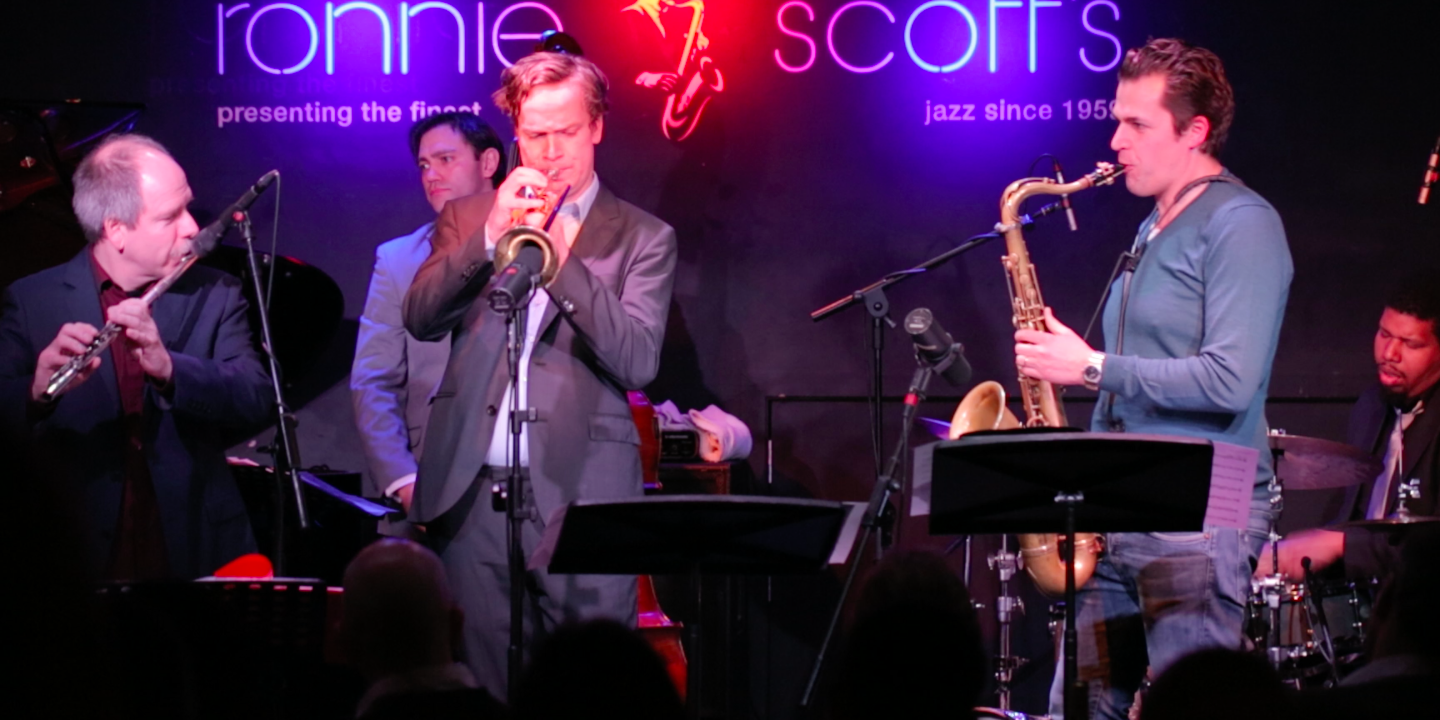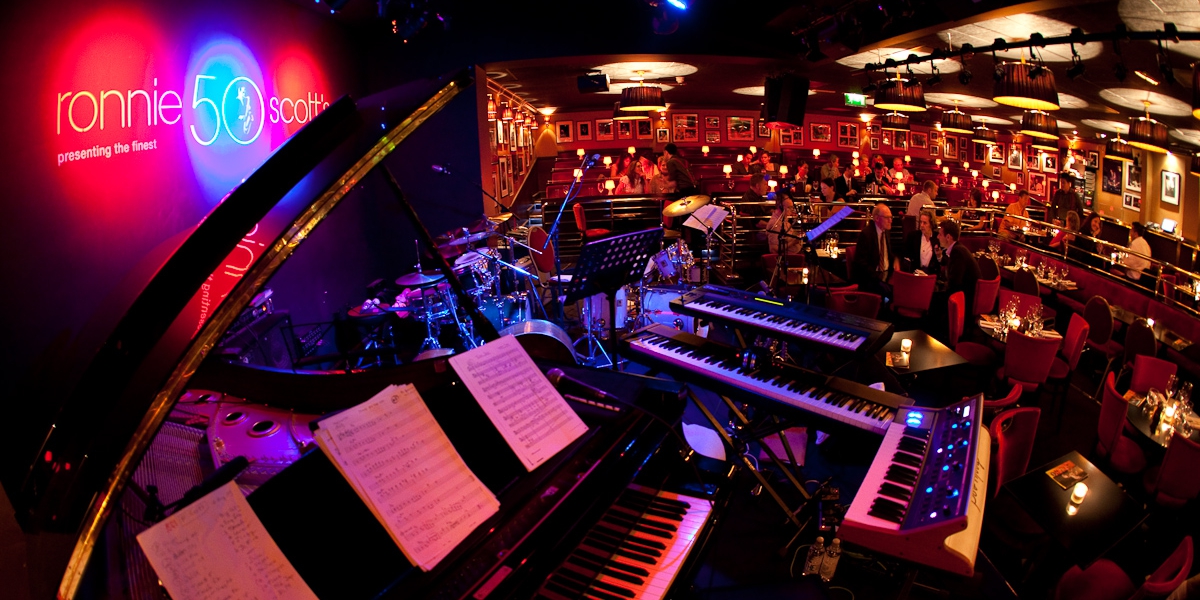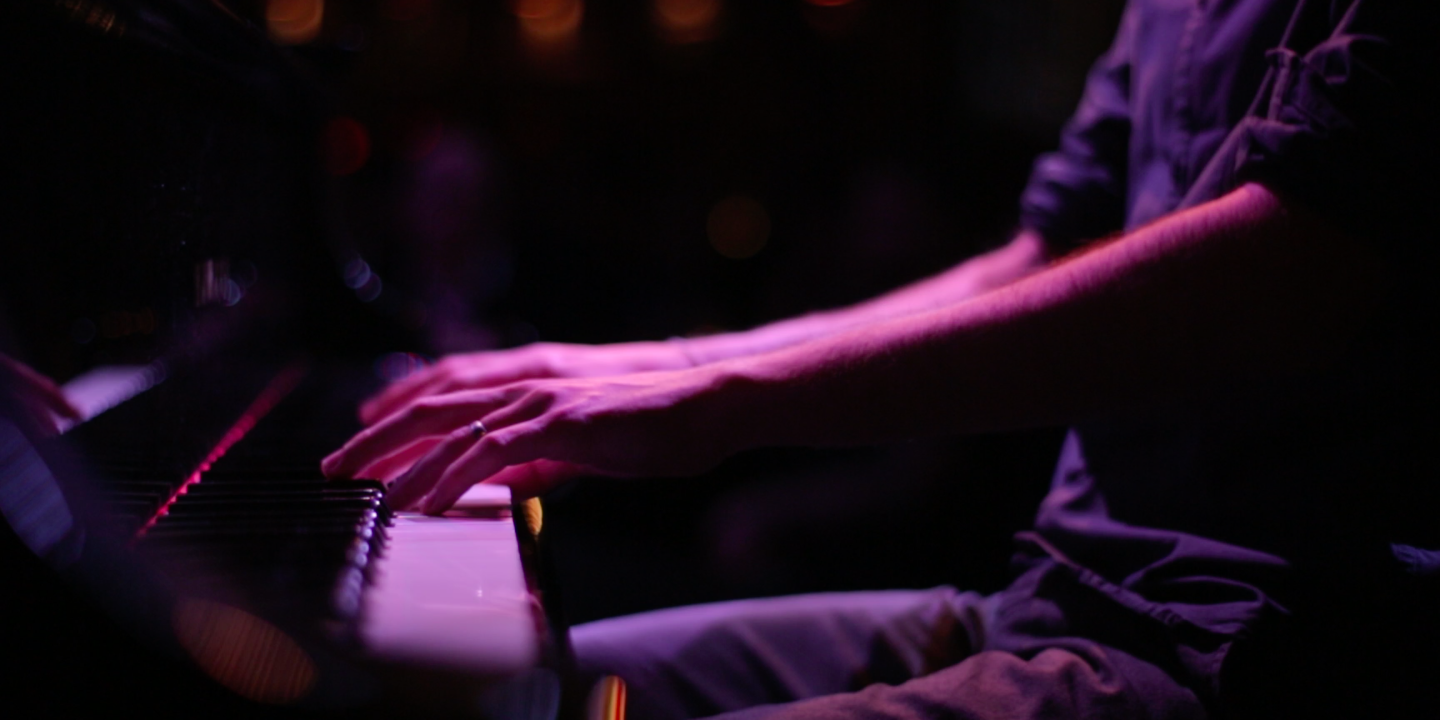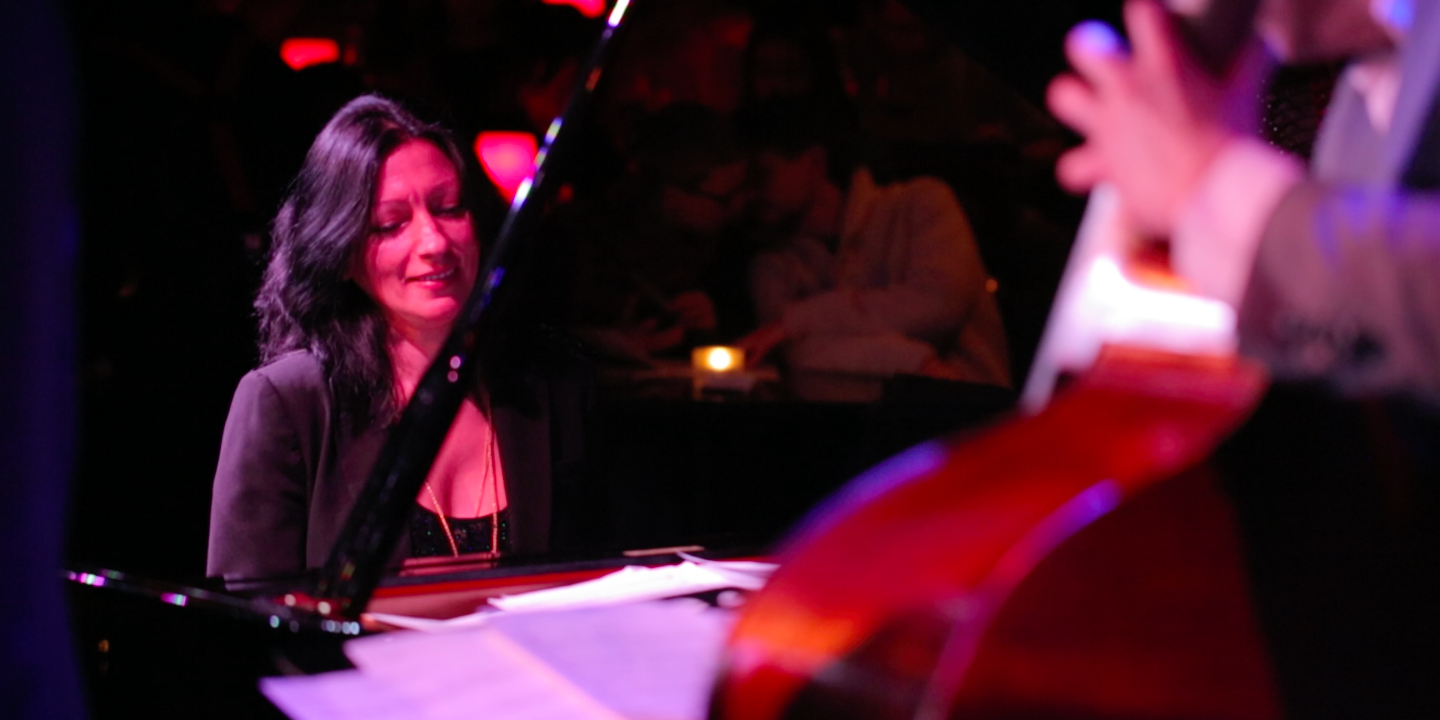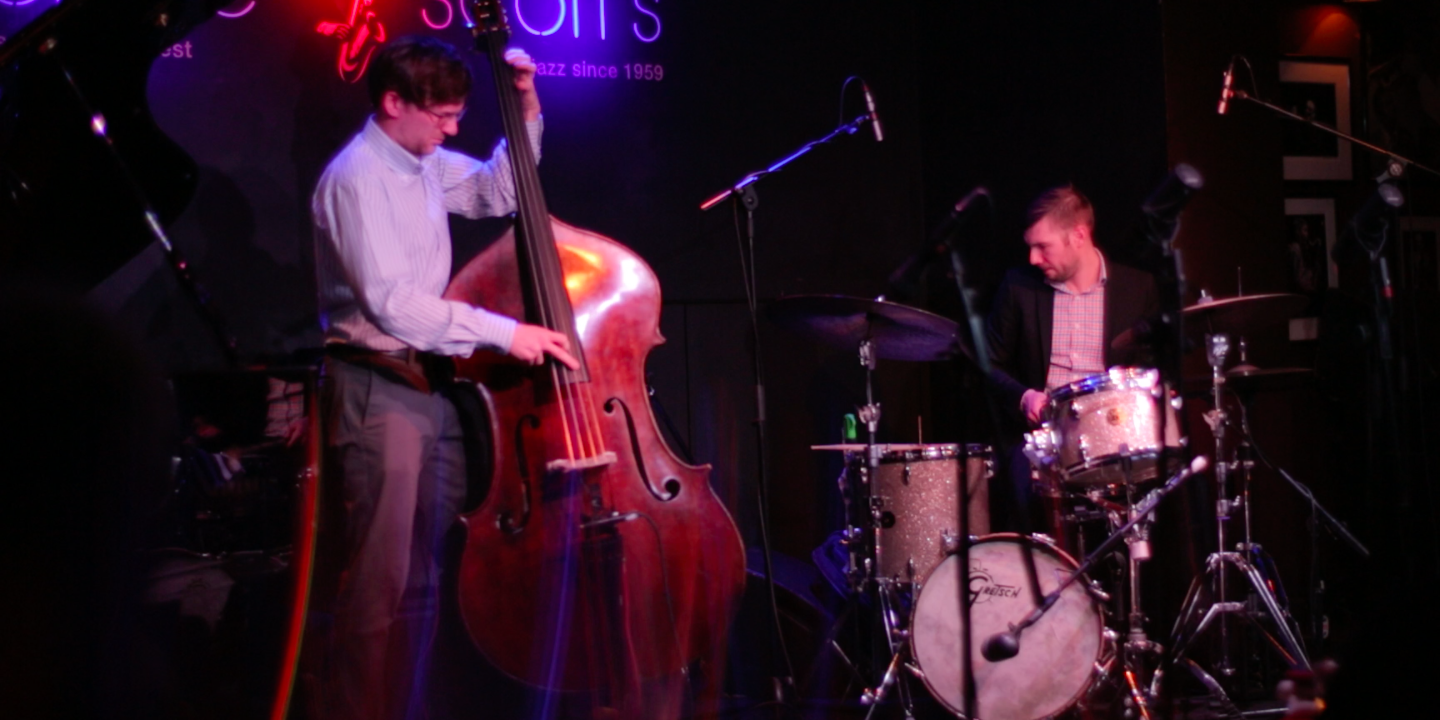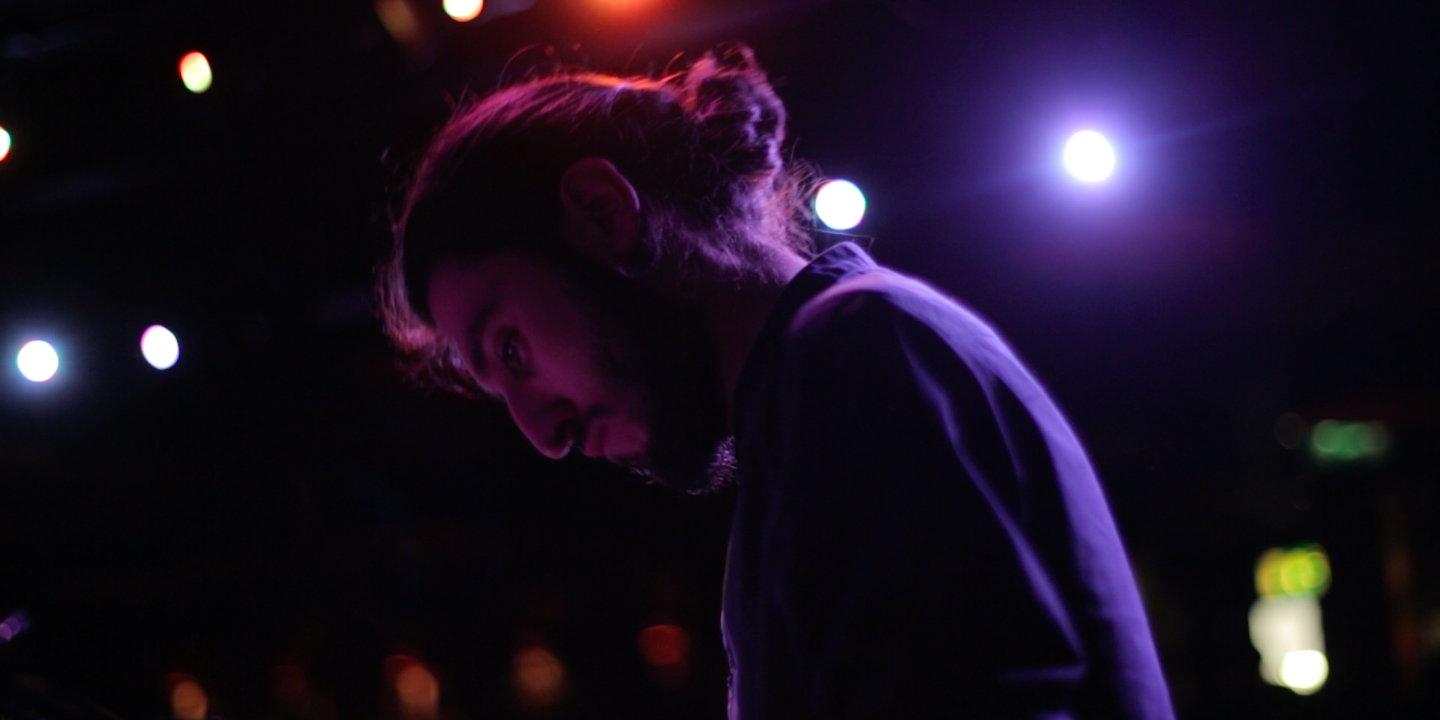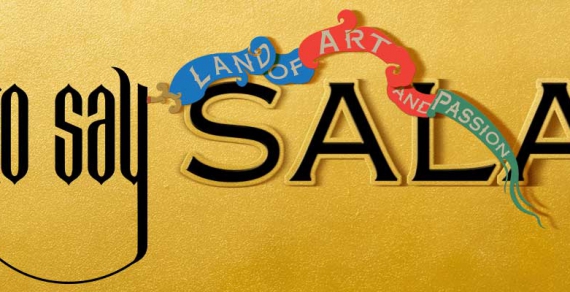Jazzerbaijan
Jazzerbaijan
RONNIE SCOTT’S
JAZZERBAIJAN
09 FEBRUARY
EVENT REPORT
JAZZERBAIJAN
Ronnie Scott’s
47 Frith Street
London W1D 4HT
Tel: 020 7439 0747
PARTICIPANTS
Amina Figarova sextet
Amina Figarova (piano)
Bart Platteau (flutes)
Frederik Koster (trumpet)
Johannes Mueller (tenorsax)
Jeroen Vierdag (bass)
Jason Brown (drums)
Isfar Sarabski trio
Isfar Sarabski (piano)
Makar Novikov (bass)
Alexander Mashin (drums)
INTRODUCTION
BACKGROUND
From pioneering bands of the oil boom era to fans huddling around illicit BBC broadcasts in the Stalin era, jazz is woven deeply into the cultural history of Azerbaijan. Some say it’s the sense of improvisation, a characteristic shared with much of Azerbaijan’s traditional music; others argue it’s a natural reflection of the country’s historic position as a crossroads of cultures. What is undeniable is that jazz
Today leading Azeri jazz musicians, such as Shahin Novrasli and Aziza Mustafa Zadeh, enjoy a global reputation and Baku’s international jazz festival is one of the highlights of the city’s cultural calendar. The stars names of Azerbaijan’s jazz scene are building a reputation far beyond their homeland, winning prizes at Montreux and collaborating with a host of big names all around the world.
The modern-day popularity of jazz is a huge turnaround from the bleak situation in the middle of the 20th century. Back then Baku was a hidden, isolated city, trapped behind the Iron Curtain and cut off from international influences. Jazz, meanwhile, was a dirty word: official Soviet cultural policy regarded this as an undesirable foreign influence and banned public performance of anything that didn’t meet the exacting ideological needs of the commissars. Students from that time recall clandestine concerts with a sentry posted at the door to alert musicians to the arrival of anyone in a position of authority. Even after Stalin’s death led to a tacit acceptance, Soviet jazzmen were harried by officials, prompting many to defect in search of greater opportunities. The value of that legacy has only been recognised in more recent times.
Yet jazz first arrived in Baku more than a century ago. The city’s oil boom pushed it to the forefront of the business world as Azerbaijan began to deliver the fuel for Europe’s rapid industrialisation. Before its Soviet isolation, Baku was a vibrant town, buoyed by a gushing tide of petrodollars and rapidly transforming itself into a cosmopolitan centre. Inevitably the emerging class of newly-wealthy oil barons sought to follow the fashions of Europe and America, and at the turn of the 20th century that meant a suddenly vogue for jazz. Newspaper reports of that era confirm that jazz bands were a fixture in the city’s bars and restaurants, even if it is far from clear how good these early performers might have been.
Even after the Soviets took power, Azerbaijan remained a jazz hotspot – at least until Stalinist paranoia officially shunned this ‘degenerate’ foreign music. In the 1930s, during the last great flowering of experimental Soviet art, the State Jazz Ensemble that toured the USSR was directed by the great Azerbaijani conductor Niyazi and led by pianist and composer Tofig Guliyev. Today Baku’s jazz musicians can trace their cultural heritage right back to this historic source.
PARTICIPANTS
Amina Figarova
Composer and pianist Amina Figarova’s 12th album, titled Twelve — her debut release on the renowned independent German label In + Out — celebrates jazz is an international music and New York City as a locale where jazz gypsies may feel most at home. Twelve is suffused with the heightened expectations, sense of adventure and fresh perceptions, as well as the confidence, creative energies and nuanced fulfillment that artists gain from being in the right place at the right time.
She has toured extensively, developing a tight-knit ensemble that, despite inevitable personnel changes, has attained a distinctive and inimitable voice by concentrating on all-original repertoire for almost 18 years. During that period, having collaborated with musicians residing in both the U.S. and Europe and having built up a circuit of welcoming venues, the Amina Figarova Sextet has triumphed at the main stage of the Newport Jazz Festival, been invited repeatedly to New Orleans Jazz and Heritage Festival, won critical and audience acclaim in Chicago, Detroit, Paris, Amsterdam — and of course New York.
Amina’s pieces strike a perfect tone, employing genuinely beautiful harmonizations, to capture fleeting thoughts that accompany those precious moments when the puzzling jostle of daily existence comes into unexpected but deeply satisfying sync.
Piano
Bart Platteau
Born in Brussels in 1965, studied at the Brussels Conservatory where he got the First Price for Classical Percussion, Chambermusic and Solfegio. Worked for several classical Philharmonic orkestraal as the Orchestre National de Belgique, Brussels National Opera Orchestra, and different chambermusic ensembles. Studied jazz in Belgium with John Ruocco, Nathan Davis, Joe Lovano at the jazzworkshops in Dworp.
Graduated Jazz flute performance studied at the Rotterdam Conservatory in 1993, and studied at the Berklee College of Music in Boston with George Garzone and Matt Marvuglio. Recorded his first CD ” Attraction” together with his wife Amina Figarova in 1995, and since hen released more then 10 CDs with the Amina Figarova Group. Main teacher Jazz Flute at the Rotterdam Conservatory from 1998 till 2011.
Nowadays living in New York, and performing and traveling around the world with the Amina Figarova Sextet. Performed in the USA, Canada, Brazilie, Mexico, Dutch Antilles, Indonesia, Azerbaijan, UK, Greece, Italië, Tunesië, UAE, France, Germany, Denmark, Austria, Croatia, Malaysia, South Afica, Belgium, Netherlands, Luxembourg, etc….
Flutes
Frederik Köster
In 2007 Frederik was appointed professor for jazz trumpet at the Hochschule für Musik der Fachhochschule Osnabrück and since 2010 he is also teaching at the Hochschule für Musik, Theater und Medien in Hannover.
In September 2006 Frederik was awarded best soloist at the Jazz Hoeilaart International Contest in Belgium. He has been on tour with a multitude of ensembles to Namibia, South Africa, Austria, Switzerland, Spain, Holland, Poland, Great Britain, Belgium, Bulgaria, Rumania and Albania. The Frederik Köster quartet was awarded the Neuer Deutscher Jazzpreis 2009, with Frederik additionally claiming first prize for best soloist. He was awarded an ECHO JAZZ for “ZEICHEN DER ZEIT” in the category “instrumentalist of the year national — brass instruments”. In October 2010 Frederik Köster was awarded the WDR Jazzpreis in the category “Improvisation”. In January 2013 he was awarded the Westfalen Jazzpreis.
With the Frederik Köster Quartet he released three albums, played on well known international Jazz Festivals like the german Jazz Baltica, Moers Festival, the North Sea Jazz Festival in Rotterdam or the Euro Jazz Festival in Mexico City and toured with Support of the Goethe Institut to Mexico, Nicaragua, Costa Rica, Honduras, Portugal and India.
Trumpet
Johannes Mueller
Johannes Mueller, born in 1981 in Saarlouis , studied at the University of Music and Performing Arts in Mannheim with Juergen Seefelder and Johannes Enders . He graduated in 2006. Since 2007 he holds his master’s degree in music. His bio is characterized by a wide range of international engagements and productions.
So from 2002 to 2005 he was a member of the German National Jazz Orchestra (BuJazzO). He is co-initiator of the project ” Euro — jazz ” with the HR Big Band, where he often plays as a guest. Furthermore, he is involved in numerous theater productions. As a soloist, he plays internationally at major jazz festivals such as San Jose , London, The Hague, Brussels , Cape Town, Mumbai , Delhi, Sapporo , etc. In 2005 he won the soloist prize in the BigBand- Competition of universities of the Federal Republic of Germany. On tours and concerts, he has played so far in 27 countries around the world ( including the US , India, South Africa , Malaysia, China , Namibia, Russia, Britain , etc. ). But also in the studio Müller could ask his talent . Until today he appeared on 22 recordings.
As a teacher, he taught at the International Jazz Holidays Saarwellingen 2006, 2007, 2008, 2014 and he gave master classes at the University of Cape Town and Durban.
Since 2013, he plays the lead-alto in the police (big) band of the Saarland and since 2014 he teaches jazz saxophone at the University of Music in Saarbruecken.
Tenorsax
Jeroen Vierdag
Bass player Jeroen Vierdag (1976) graduated cum laude at the Conservatory of Amsterdam in the year 2000. He plays the bass guitar and double bass.
Jeroen plays in a lot of styles, such as pop, jazz, Brazilian and Latin.
Seven years ago he was very successful, together with drummer Lucas van Merwijk and guitarist Leonardo Amuedo (Trio A.M.V.) during the period when they released the cd “Live in Amsterdam”. Since then he has played and toured with many artists from the Dutch music scene.
Currently he is a member of The Ploctones (with Anton Goudsmit), Nueva Manteca and he plays with Francien van Tuinen, Ed Verhoeff, Amina Figarova, Bart Wirtz, Tom Beek and Los Hermanos Martinez. He is also a teacher at the Jazz and Latin department at the Rotterdam Conservatory.
His versatility and flexibility makes him an in demand bass player.
Bass
Jason Brown
In demand drummer, Jason Brown, has been a driving force behind major artists since the early days of his career. A graduate of Oberlin Conservatory, Ohio; Brown learned his trade under the tutelage of Billy Hart.
For seven years he toured and recorded with Grammy nominated vocalist & composer, Carmen Lundy; with Pat Martino he appeared at major festivals worldwide, such as Jarasum International Jazz Festival and Rochester Jazz Festival. He has also worked with renowned artists such as Lizz Wright, Cedar Walton, Nicholas Payton, Wayne Escoffery and Kurt Rosenwinkel.
Now a key member of Amina Figarova’s Sextet, Jason Brown has performed at the Joy of Jazz Festival in Johannesburg and major venues throughout Europe and the USA.
As a leader, Brown has been a featured artist with the Jazz Philharmonic Orchestra of St Petersburg on several occasions and taken his quintet, featuring saxophonist Steve Grossman, to the White Knight’s Festival in Russia. He has also led his own bands at Smalls Jazz Club and various other venues in New York and throughout the USA, Russia and Ukraine.
Drums
ISFAR SARABSKI
Isfar Sarabski. Remember the name. No, it doesn’t flow … freely across the lips … but you’re going to be hearing it, nonetheless.’
So says veteran US jazz critic Don Hackman. He was speaking after Sarabski’s 2012 performance at Montreux, a festival where the young Baku-born jazz pianist is becoming an institution after winning there in 2009.
He’s also a regular fixture at Buta events, appearing in London twice in the first Buta festival. As well as a solo recital he also provided a live soundtrack to the audio-visual ‘Oil & Jazz’ experimental project. Sarabski’s influences include Azerbaijan’s own Vagif Mustafa Zadeh and the likes of Hancock and Keith Jarrett. In 2011 he enrolled at the Berkeley College of Music, studying under Danilo Perez, another of his idols.
Sarabski performs at the opening gala with bass player Makar Novikov and drummer Alexander Mashin.
Piano
Alexander Mashin
Alexander Mashin was born in 1976 in St. Petersburg, Russia. In 1991 he joined the Kvadrat jazz-club where he met many jazz musicians of St. Petersburg.
After studying for two months at the Musorgsky Music School, he decided to start his professional career as an artist and quit the school.
From 1995 to 1998, Alexander was a permanent member of the quartet of saxophonist Igor Butman.
In 1998, Alexander participated in the creation of MosGorTrio band and moved to Moscow where he also kept busy collaborat- ing with some of Russia’s best jazz musicians.
In 2005 Alexander Mashin participated in the educational pro- gram Open World Program USA in New York and played with such legends as Clark Terry, Kenny Barron and Jimmy Heath at the Blue Note Jazz Club.
Since 2008 Alexander has invited many foreign musicians to per- form along with his band all over Russia.
Alexander Mashin performed with a long list of musicians such as Benny Golson, Clark Terry, Jimmy Heath, Kenny Barron, Johnny Griffin, Lew Tabackin, Eddy Henderson, Deborah Brown, James Spaulding, Steve Slagle, Gary Smulyan, Larry Schneider, Mark Turner, Jimmy Green, Craig Handy, Donny McCazlin, Alex Sipiagin, Paul Bollenback, Mark Murphy, JD Walter, Sachal Vasandani, Giacomo Gates, and many others.
Drums
Makar Novikov
Novikov Makar was born in 1983 in Big Vyazemy, Moscow Region. He started to play double bass at 18. In 2004 he graduated from Dunaevsky music school, his teacher was Dmitry Chistyakov , and in 2005 graduated from the Moscow Regional College of Art , Professor Alexander Veremiov. In 2009 he graduated from the Russian Academy of Music, his teacher was Evgeny Onishenko.
In 2005 Makar was in New York with a group of Russian students who performed in the Blue Note club with such masters as Kenny Barron, Jimmy Hit, Clark Terry, it was Open world program. In 2007 he took 1st prize in the international competition in Rostov. Makar is winner of the Dodge junior competition in 2003, 2005. He participated in many Russian and international festivals with Academic Band, conducted by Anatoly Kroll.
In 2008 Makar begun to play with Yakov Okyn and Alexander Mashin in Mosgortrio band, which performed with many special guests, such as Judy Bady, Jimmy Greene, James Spaulding, Gary Smulyan, Steve Slagle, Giacomo Gates, Craig Handy, Lew Tabakin, Debora Brown, and Alexander Sipyagin.
Bass
Ronnie Scott’s Jazz Club
Since it opened in the heart of Soho in the 60s, Ronnie Scott’s has been one of the hottest spots in the UK jazz scene, and its visiting performers read like a who’s who of the world’s leading musicians, from Ella Fitzgerald, Miles Davis and Count Basie to Jimi Hendrix, Wynton Marsalis and Katie Melua. Jazz has become a huge part of the contemporary sound of Azerbaijan, even though when Ronnie Scott’s opened its doors the USSR regarded this as undesirable decadent music. Today, however, Azerbaijan’s leading jazz musicians have a large stage of their own in Baku’s annual international jazz festival and regular appearances at leading venues and events worldwide.




